
Benchmarks and test results …
Let us now turn to the benchmark results. The test results are done with an ASRock Z270 Taichi motherboard. Microsoft Windows 7 Ultimate Edition and Windows 10 Enterprise Edition 64-bit are currently used as the operating system.
The following SSD benchmark software are used to check and compare the speed of the drive:
AS SSD Benchmark – Download
ATTO Disk Benchmark – Download
CrystalDiskMark – Download
HD Tach – Download
SiSoftware Sandra – Download
The AS SSD benchmark values provide a very good reference point for the maximum possible read and write speed, the speed for smaller files and their respective access times. By the way, 4K means that small 4K blocks are read or written and with 4K 64Thrd this is distributed to 64 threads at the same time. Thus the benchmark program simulates a typical program start, for example.
The Crucial P1 SSD in the Orico PCM2-C3-GY USB 3.1 case was able to achieve an extremely sequential reading speed of 972.38 MB/s in Windows 10 and an equally extremely high writing speed of 908.88 MB/s. The Crucial P1 SSD is also available in the Orico PCM2-C3-GY USB 3.1 case. In AS SSD, the Crucial P1 SSD in the Orico PCM2-C3-GY case achieves a very good overall score of 593 points despite USB 3.1!
By the way, the usable capacity of the Crucial P1 1TB M.2 SSD CT1000P1SSD8 is 931.51 GB after over provisioning.
Here is a snipping screenshot of the AS SSD benchmark values:
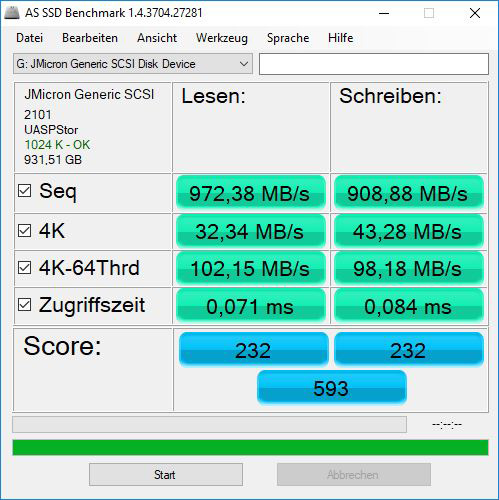
And here is another snipping screenshot of the AS SSD iops results:
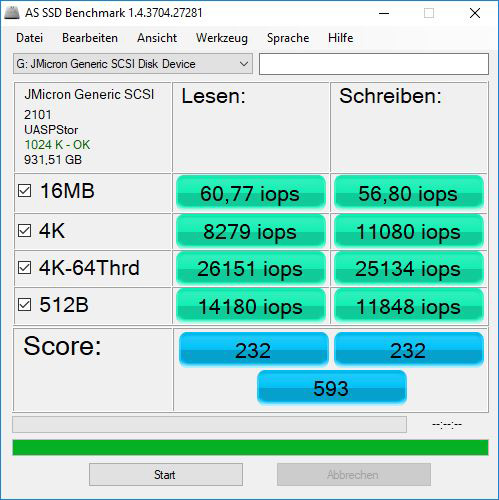
In Windows 7 we only achieved a read and write speed of around 400 MB/s, but this was to be expected.
The comparison of the AS SSD benchmark results is extended with each new HDD/SSD test. Here you can see some SSDs compared to the Crucial P1 SSD in the Orico PCM2-C3-GY USB 3.1 case, whereby the graphics are regularly updated with new SSD drives. At the time of testing the top of the AS SSD overall score is led by the Samsung 960 Pro M.2 NMVe SSD and under Windows 7 the SSD joins the Orico PCM2-C3 frame in the lower field. This is still a great result for an external USB drive.
Here is a comparison of the AS SSD benchmark values, which are gradually extended with new drives:
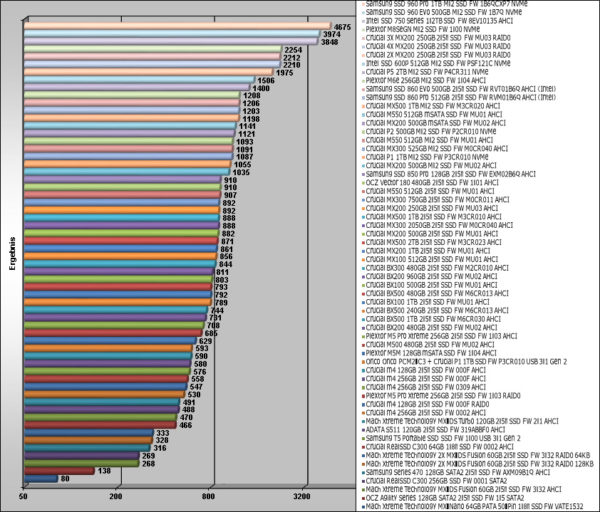
And here is an excerpt of the latest AS SSD benchmark results for a better overview, which will be replaced step by step with the newest drives:
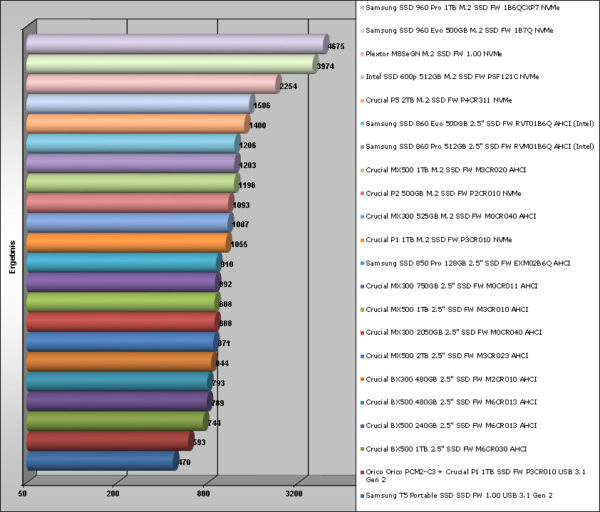
The ATTO Disk Benchmark values give a very good overview of how the write and read speeds perform at different file sizes. However, the measured values are maximum values, which should not be confused with the continuous transfer rates, as this benchmark can be higher even for SSDs with slower overall performance.
With the Orico PCM2-C3-GY USB 3.1 Gen2 SSD, the read speed (green) is already above the write speed (red) from a transfer size of approx. 0.5KB and reaches the maximum read values of 1081375KB with a transfer size of 1024KB. The Micron 3D QLC NAND Flash delivers an astonishingly even result, which we otherwise only know from MLC SSDs.
Here is a snipping screenshot of the ATTO disk benchmark values:
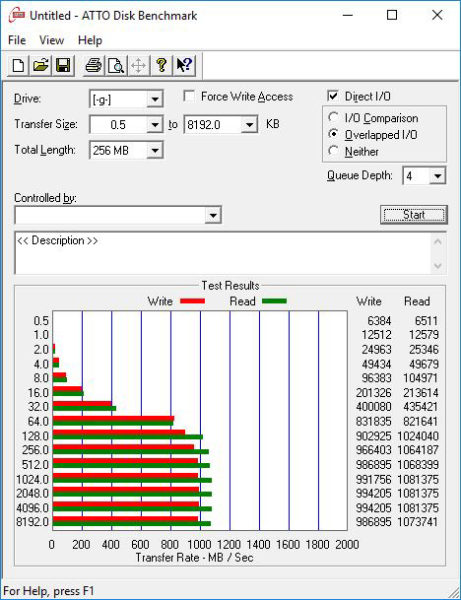
The ATTO Disk benchmark values are now compared with a small transfer of 32KB and a large transfer of 8192KB. The bar graph already contains a comparison to some SSDs and hard disks, where the Crucial P1 in the Orico PCM2-C3-GY USB 3.1 Gen2 case is in the upper part of the SSDs with ATTO. Here, the SSD achieves an amazingly good result as an external USB drive.
Here is a comparison of the ATTO disk benchmark values, which are expanded step by step with more new drives:
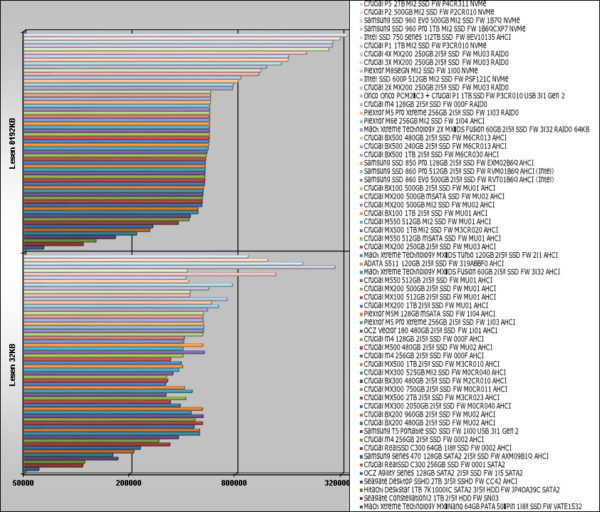
And for a better overview, here is an excerpt of the latest ATTO Disk Benchmark values, which is gradually being replaced with the latest drives:
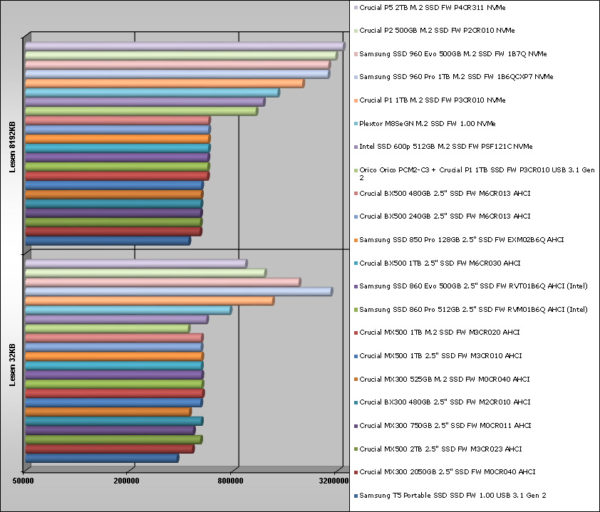
CrystalDiskMark also provides a balanced measurement of performance with different transfer sizes.
Here the Crucial P1 in the Orico PCM2-C3-GY USB-C case achieves sequential read values of 838.1 MB/s and write values of 833.3 MB/s.
Here is a snipping screenshot of the CrystalDiskMark values:
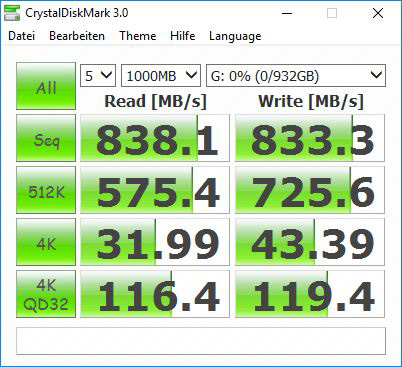
The following diagram shows the CrystalDiskMark results compared to the other SSDs and disks that are expanded step by step. The CrystalDiskMark comparison clearly shows the differences between the solid state drives and hard disks tested so far.
Here is a comparison of the CrystalDiskMark values, which will be extended bit by bit with new drives:
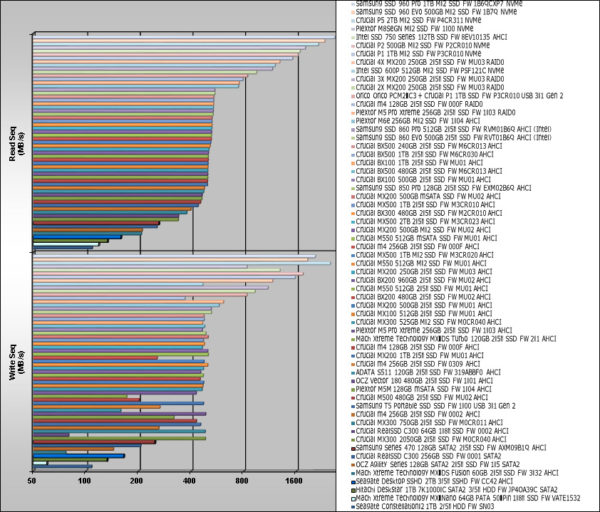
And here is an excerpt of the latest CrystalDiskMark values for a better overview, which will be replaced step by step with the newest drives:
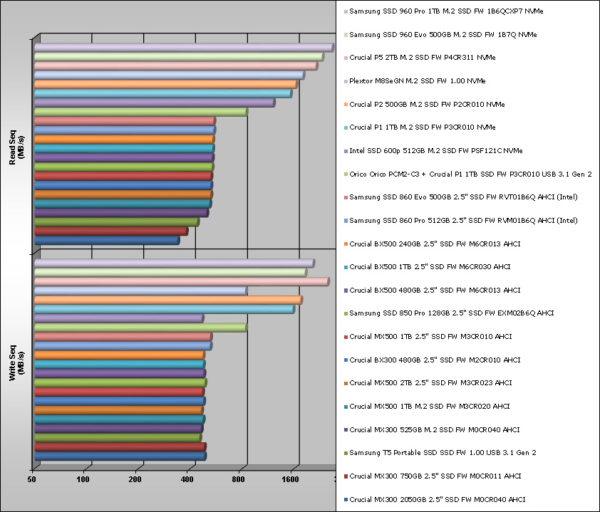
With the HD Tach benchmark values, one can very easily see the performance curve, which, however, is clearly different with an SSD than with a conventional HDD. Due to the novel logical management of the SSD controllers when accessing the NAND cells, the values can vary with the HD Tach Version 3.0.4.0, which is designed for hard disks, as with similarly structured SSDs.
The Crucial P1 in the Orico PCM2-C3-GY USB 3.1 Gen2 case shows in HD Tach a very continuous transfer image with one of the lowest displayed access times of 0.1ms during read and write operations. The strong peaks during write operations of the previously tested TLC SSDs are also absent here.
For comparison, you can move the mouse pointer over the following drives to see the respective benchmark values:
Crucial P1 im Orico PCM2-C3-GY USB 3.1 Gen2 Case, Crucial MX500 1TB M.2 2.5″ SSD, Crucial MX500 1TB 2.5″ SSD, ADATA S511 120GB SSD, ADATA S511 120GB SSD, Crucial BX300 480GB 2.5″ SSD, Crucial BX200 960GB 2.5″ SSD, Crucial BX200 480GB 2.5″ SSD, Crucial BX100 1TB 2.5″ SSD, Crucial BX100 500GB 2.5″ SSD, Crucial MX100 512GB 2.5″ SSD, Crucial MX200 1TB 2.5″ SSD, Crucial MX200 500GB 2.5″ SSD, Crucial MX200 500GB M.2 SSD, Crucial MX200 500GB mSATA SSD, Crucial MX200 250GB 2.5″ SSD, 2x Crucial MX200 250GB 2.5″ SSDs RAID0, 3x Crucial MX200 250GB 2.5″ SSDs RAID0, 4x Crucial MX200 250GB 2.5″ SSDs RAID0, Crucial MX300 750GB 2.5″ SSD, Crucial MX300 525GB M.2 SSD an SATA3 AHCI, Crucial MX300 2050GB 2.5″ SSD, Crucial M500 480GB 2.5″ SSD, Crucial M550 512GB 2.5″ SSD, Crucial M550 512GB M.2 SSD, Crucial M550 512GB mSATA SSD, 2x Crucial m4 128GB 2.5″ SSD an SATA3 RAID, Crucial m4 128GB 2.5″ SSD, Crucial m4 128GB 2.5″ SSD an SATA3, Crucial m4 256GB 2.5″ SSD FW 000F, Crucial m4 256GB 2.5″ SSD FW 0309, Crucial m4 256GB 2.5″ SSD FW 0002, Crucial m4 256GB SSD FW 0309 an SATA3 IDE, Crucial m4 256GB 2.5″ SSD FW 0002 an SATA3, Crucial C300 64GB 1.8″ SSD an SATA3, Crucial RealSSD C300 256GB 2.5″ SSD an SATA3, Crucial RealSSD C300 256GB 2.5″ SSD an SATA2, Hitachi 7K1000.C 1TB HDD, Intel SSD 750 1200GB PCIe Karte Gen3 x4, Intel 600p 512GB M.2 NVMe SSD an SATA3 AHCI, MX-DS Fusion 60GB SSD SATA3 IDE, MX-DS Fusion 60GB SSD SATA3 IDE, MX-DS Turbo 120GB SSD, OCZ Agility 128GB SSD, OCZ Vector 180 480GB 2.5″ SSD, Plextor M8SeGN 512GB M.2 NVMe SSD, Plextor M6e 256GB M.2 SSD PCIe AHCI, 2x Plextor M5 Pro Xtreme 256GB 2.5″ SSD an SATA3 RAID0, Plextor M5 Pro Xtreme 256GB 2.5″ SSD, Plextor M5M 128GB mSATA SSD, Samsung 960 Evo 500GB M.2 PCIe NVMe Gen3 x4 SSD, Samsung 960 Pro 1TB M.2 PCIe NVMe Gen3 x4 SSD, Samsung SSD 860 Pro 512 GB SSD an Intel SATA3 AHCI, Samsung SSD 860 Evo 500 GB SSD an Intel SATA3 AHCI, Samsung Series470 128GB SSD AHCI, Samsung 470 128GB SSD Legacy IDE, Samsung 850 Pro 128GB 2.5″ SSD, Samsung T5 Portable 500GB USB 3.1 SSD, Seagate Constellation.2 1TB 2.5″ HDD an SATA3, Seagate ST2000DX001 2TB 3.5″ SSHD, Toshiba MK8007GAH 1.8″ HDD.
Here is a snipping screenshot of the HD Tach benchmark results:
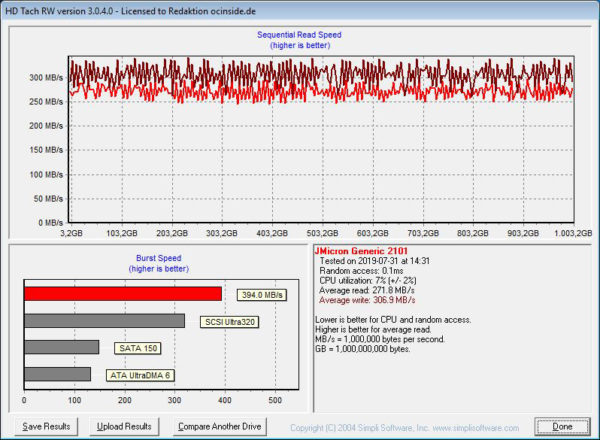
Here is a comparison of the HD Tach benchmark results, which are gradually being expanded with new drives:
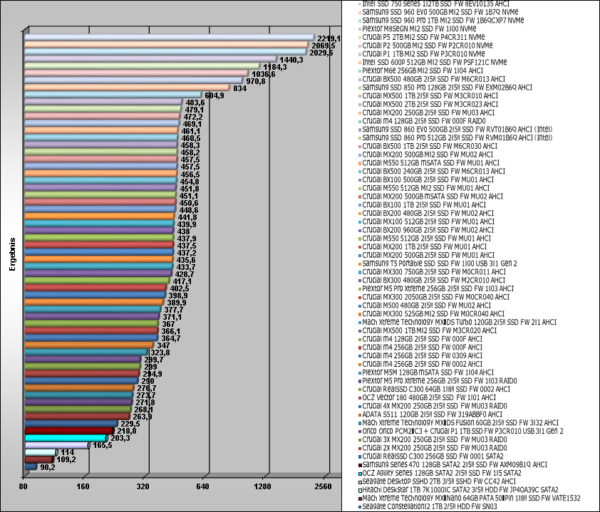
And here is an excerpt of the latest HD Tach benchmark results for a better overview, which will be replaced bit by bit with the newest drives:
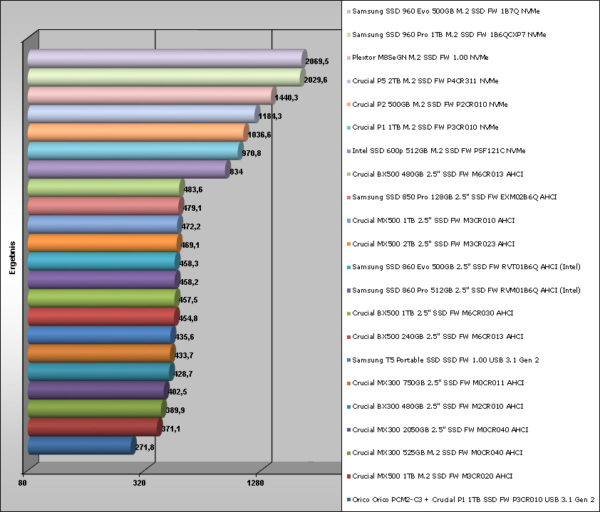
SiSoftware Sandra Benchmark result …
Of course, the SiSoftware Sandra benchmark could not be missing in this test series. With the SiSoft Sandra program, SiSoftware has had a very comprehensive tool on the market for several years, with which one can obtain very reliable test results from all hardware components.
The average access time of the Crucial P1 SSD in the Orico PCM2-C3-GY USB 3.1 case was very low for SiSoftware Sandra with 37us and the drive index of 1033.98 MB/s is extremely high for an external SSD.
Here is a snipping screenshot of the SiSoftware Sandra benchmark read values:

In the SiSoftware Sandra write performance measurement, the average access time of the Crucial P1 SSD in the Orico PCM2-C3-GY USB 3.1 case was also very low at 34us and the drive index also reached extremely high 859.13 MB/s for an external SSD.
Here is a snipping screenshot of the SiSoftware Sandra benchmark write values:

Here is a comparison of the SiSoftware Sandra benchmark results, which will be extended step by step with more new drives:
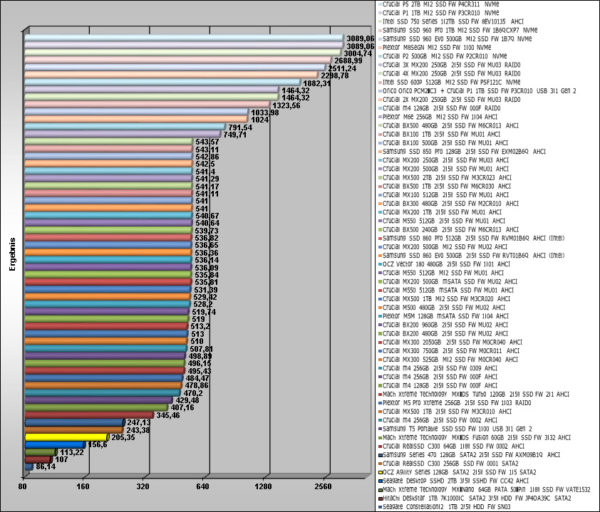
And here is an excerpt of the latest SiSoftware Sandra benchmark values for a better overview, which will be replaced step by step with the newest drives:
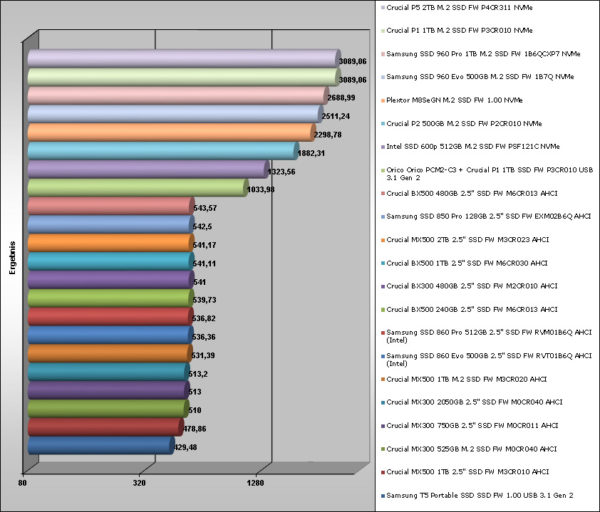
Orico PCM2-C3-GY USB 3.1 Gen2 Result and general impression …

